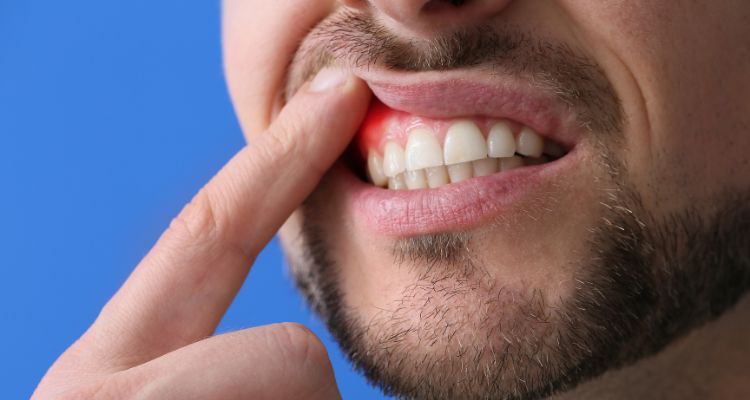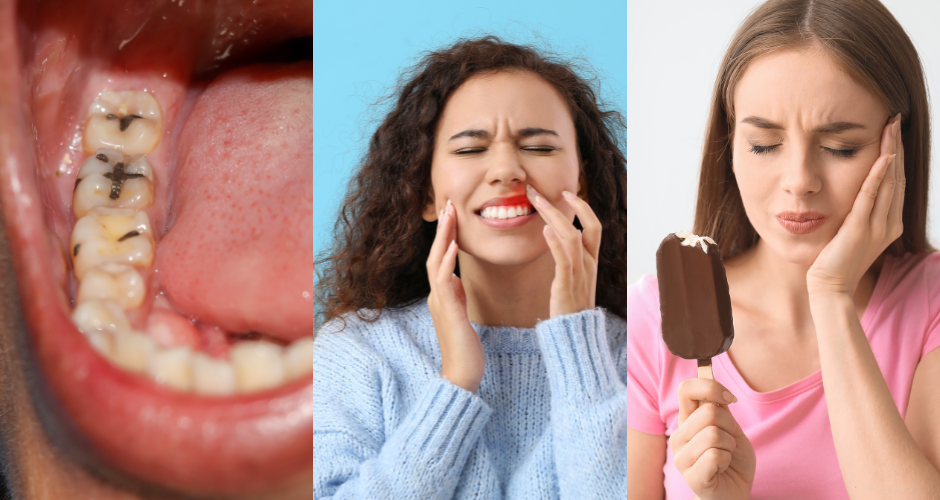Common Dental Problems and How to Prevent Them

Your smile is one of your most valuable assets, and maintaining good oral health is essential not only for a confident grin but also for your overall well-being. Unfortunately, dental problems are a common occurrence for many people. In this comprehensive guide, we will explore some of the most prevalent dental issues, from tooth decay to gum disease, and provide you with expert advice on how to prevent them. Let’s embark on a journey to understand common dental problems and discover the best ways to keep your smile bright and healthy.
Common Dental Problems

- Tooth Decay (Cavities): Tooth decay, also known as cavities or dental caries, occurs when the hard enamel covering your teeth is damaged by acid-producing bacteria. This damage leads to the formation of small holes or cavities in the teeth.
- Prevention: To prevent tooth decay, maintain good oral hygiene by brushing and flossing regularly. Limit your intake of sugary foods and beverages, and consider dental sealants for added protection. Regular dental check-ups also play a crucial role in early detection and treatment of cavities.
- Tooth Sensitivity: Tooth sensitivity is a condition where you experience discomfort or pain when consuming hot, cold, sweet, or acidic foods and beverages. It often occurs when the protective enamel is compromised, exposing the sensitive dentin underneath.
- Prevention: Prevent tooth sensitivity by using a desensitizing toothpaste, maintaining good oral hygiene, and protecting your enamel by avoiding acidic foods and drinks. If sensitivity persists, consult your dentist for further evaluation and treatment options.
- Bad Breath (Halitosis): Halitosis, or bad breath, is the persistent presence of unpleasant odor in the mouth. It can be caused by poor oral hygiene, gum disease, or underlying dental issues.
- Prevention: Practice excellent oral hygiene, including brushing your tongue, staying well-hydrated, and visiting your dentist regularly. Addressing any underlying dental problems or infections can also help eliminate bad breath.
- Missing Teeth: Missing teeth can result from various causes, including tooth decay, gum disease, injury, or genetics. It can impact your appearance, ability to chew, and overall oral health.
- Prevention: To prevent missing teeth, maintain good oral hygiene, wear a mouthguard during physical activities, and consider dental implants, bridges, or dentures as replacement options.
- Dental Erosion: Dental erosion occurs when the enamel on your teeth is gradually worn away by acidic substances, such as carbonated beverages, citrus fruits, or frequent vomiting.
- Prevention: Limit the consumption of acidic foods and drinks, rinse your mouth with water after consuming them, and maintain good oral hygiene practices to minimize enamel erosion.
- Teeth Misalignment: Teeth misalignment, also known as malocclusion, involves improper alignment of teeth and jaws. It can result in bite issues, speech problems, and difficulty cleaning teeth.
- Prevention: Early orthodontic intervention, such as braces or Invisalign, can help correct misalignment. Regular dental check-ups can also detect alignment issues early.
Common Oral and Dental Problems in the Elderly

Dental problems are not exclusive to any specific age group, but they can become more common and complex as people age, especially among the elderly population. Here are some common dental problems that often affect older adults:
1. Gum Disease (Periodontal Disease): Gum disease is a prevalent dental problem among older adults. It begins as gingivitis, characterized by inflamed and bleeding gums, and can progress to periodontitis, which involves gum recession and potential tooth loss.
- Prevention: Regular dental check-ups, daily oral hygiene, and professional cleanings can help prevent gum disease. Quitting smoking and maintaining a balanced diet are also essential.
2. Tooth Loss: Tooth loss can result from various factors, including gum disease, tooth decay, and natural aging. Missing teeth can impact chewing ability, nutrition, speech, and self-esteem.
- Prevention: Practicing good oral hygiene, attending regular dental check-ups, and addressing dental issues promptly can help prevent tooth loss. Dental implants, dentures, or bridges can be used as tooth replacement options.
3. Dry Mouth (Xerostomia): Dry mouth is a common issue in the elderly, often caused by medications, medical conditions, or reduced salivary gland function. It can lead to discomfort, difficulty swallowing, and an increased risk of tooth decay.
- Prevention: Staying hydrated, using sugar-free gum or lozenges, and speaking with a healthcare provider about medication side effects can help manage dry mouth. Over-the-counter or prescription saliva substitutes may be recommended.
5. Oral Cancer: Older adults are at a higher risk of developing oral cancers, including those of the lips, tongue, cheeks, and throat. Early detection and treatment are crucial.
- Prevention: Avoiding tobacco products, limiting alcohol consumption, and receiving regular oral cancer screenings during dental check-ups are key preventive strategies.
6. Denture-Related Issues: Many older adults wear dentures (partial or full). Ill-fitting dentures, sore spots, and difficulty with chewing or speaking can be common problems.
- Prevention: Regular dental visits are essential for evaluating and adjusting dentures as needed to ensure proper fit and comfort.
7. Root Decay: Root decay occurs when the roots of the teeth become exposed due to gum recession, making them more susceptible to decay.
- Prevention: Good oral hygiene practices, fluoride treatments, and dietary modifications can help prevent root decay.
Common Problems with Dental Crowns:
Dental crowns are commonly used to restore and protect damaged or weakened teeth. While they are durable and can last for many years, several issues can arise:
- Crown Dislodgment: In some cases, dental crowns can become loose or dislodged, especially if the adhesive used to attach them weakens over time.
- Prevention: Properly caring for your crown by avoiding chewing hard or sticky foods on it can help prevent dislodgment. Regular dental check-ups can detect any issues early.
- Tooth Sensitivity: Some individuals may experience increased sensitivity in the tooth after a crown placement, especially to hot or cold temperatures.
- Prevention: Sensitivity often subsides within a few weeks. Avoiding extreme temperatures and using desensitizing toothpaste may help alleviate discomfort.
- Crown Damage: Crowns can chip, crack, or fracture over time, especially if subjected to excessive force or teeth grinding.
- Prevention: Wearing a nightguard if you grind your teeth, avoiding chewing hard objects, and practicing good oral hygiene can help prevent crown damage.
- Gum Irritation: Inflammation or irritation of the gums around the crown can occur if the crown margin doesn’t fit snugly.
- Prevention: Ensuring proper fit during crown placement and maintaining excellent oral hygiene can prevent gum irritation.
- Decay at the Margin: If the crown margin doesn’t fit tightly against the tooth, it can leave a gap where bacteria can accumulate, leading to decay.
- Prevention: Regular dental check-ups are crucial to monitor the integrity of the crown margin and address any issues promptly.

Common Problems with Dental Implants:
Dental implants are a popular solution for replacing missing teeth. However, they can also face certain issues:
- Implant Failure: In some cases, dental implants may fail to integrate with the surrounding bone or become loose over time.
- Prevention: Implant success largely depends on proper surgical technique and aftercare. Follow post-operative instructions, maintain good oral hygiene, and attend regular check-ups.
- Peri-implantitis: This is an inflammatory condition that affects the tissues surrounding the implant, potentially leading to implant loss.
- Prevention: Practicing meticulous oral hygiene, including cleaning around the implant and attending regular dental cleanings, can help prevent peri-implantitis.
- Loose or Damaged Abutments: The abutment, which connects the implant to the crown, can become loose or damaged.
- Prevention: Regular check-ups and proper care, such as avoiding chewing hard objects, can help prevent abutment issues.
How to Prevent Root Canal Failure:
Root canal treatment is performed to save a damaged or infected tooth. To prevent failure or complications:
- Follow Post-Treatment Care: Adhere to your dentist’s post-treatment instructions, which may include taking prescribed medications and attending follow-up appointments.
- Practice Good Oral Hygiene: Maintain excellent oral hygiene by brushing, flossing, and rinsing with an antimicrobial mouthwash regularly.
- Avoid Chewing on Hard Objects: Avoid biting on hard objects, such as ice or pens, which can damage the restored tooth.
- Attend Regular Check-ups: Regular dental check-ups allow your dentist to monitor the treated tooth and address any issues promptly.
- Protect Against Teeth Grinding: If you grind your teeth, wearing a nightguard can protect your restored tooth from excessive pressure.
- Maintain a Balanced Diet: Consume a diet rich in fruits, vegetables, and dairy products to ensure your teeth receive essential nutrients.
You may like 7 Best Oil To Use For Oil Pulling
Top Tips on How to Prevent Dental Problems
Maintaining good oral health and preventing dental problems is essential for a healthy smile. Here are some key steps to help prevent dental issues:
- Regular Dental Check-ups: Schedule routine dental check-ups and cleanings with your dentist. These appointments allow for early detection and treatment of any potential problems.
- Daily Oral Hygiene: Brush your teeth at least twice a day with fluoride toothpaste and a soft-bristle toothbrush. Don’t forget to floss daily to remove plaque and food particles between your teeth.
- Balanced Diet: Limit sugary snacks and beverages, as they can contribute to tooth decay. Instead, focus on a balanced diet rich in fruits, vegetables, and dairy products.
- Fluoride: Ensure that your toothpaste contains fluoride, as it helps strengthen tooth enamel and prevents cavities.
- Avoid Tobacco: Quit smoking or using tobacco products, as they can lead to gum disease and oral cancers.
- Limit Alcohol: Excessive alcohol consumption can increase the risk of oral health issues. Drink in moderation.
- Mouthwash: Consider using an antimicrobial or fluoride mouthwash as directed by your dentist to help reduce bacteria and strengthen teeth.
- Protect Teeth: If you play contact sports, wear a mouthguard to protect your teeth from injury.
- Address Teeth Grinding: If you grind your teeth (bruxism), consult your dentist for a nightguard to prevent tooth damage.
- Hydration: Drink plenty of water to keep your mouth moist and help wash away food particles and bacteria.
- Stress Management: Manage stress through relaxation techniques, as stress can contribute to teeth grinding and other dental issues.
Conclusion
In conclusion, understanding common dental problems and their prevention is crucial for maintaining good oral health throughout life. Dental issues like tooth decay, gum disease, tooth sensitivity, and more can affect anyone, but with the right knowledge and preventive measures, they can often be avoided or managed effectively.
FAQ’s
What are common dental problems?
Common dental problems include tooth decay (cavities), gum disease, tooth sensitivity, and bad breath (halitosis). These issues can affect people of all ages.
How can I prevent tooth decay and cavities?
To prevent tooth decay and cavities, maintain good oral hygiene by brushing and flossing regularly, limit your consumption of sugary foods and beverages, and consider dental sealants for added protection.
How can I prevent tooth decay and cavities?
To prevent tooth decay and cavities, maintain good oral hygiene by brushing and flossing regularly, limit your consumption of sugary foods and beverages, and consider dental sealants for added protection.
What are some common oral and dental problems in elderly individuals?
Older adults often face increased risks of gum disease, tooth loss, and oral health challenges due to aging. Regular dental check-ups are essential to address these issues.
What lifestyle choices can impact dental health?
Lifestyle choices such as smoking, excessive alcohol consumption, and dietary habits, particularly sugary snacks and beverages, can significantly impact dental health. Quitting smoking and adopting a balanced diet are essential steps for oral and overall health.






One thought on “Common Dental Problems and How to Prevent Them”